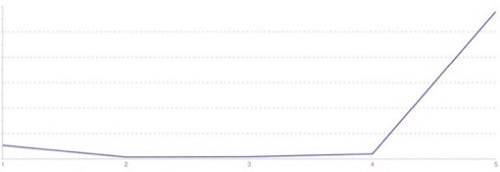Last week YouTube blogged that it is considering moving away from the familiar 5-star system of reviews. According to YouTube product manager Shiva Rajaraman, the stars system is being used bluntly by the majority of YouTube users – most give videos a perfect 5 star rating. Rajaraman noted that “when it comes to ratings it’s pretty much all or nothing.”

When you also consider that the wisdom of the crowds is often dominated by small, powerful groups, then the validity of user ratings is further called into question. So why not just get rid of explicit user ratings and use implicit recommendations instead?
YouTube graph showing the dominance of full 5-star ratings

YouTube wants to know if a thumbs up/thumbs down system would be be more effective (two options), or even just favoriting (one explicit action to say you like an item).
However possibly a better option is to remove explicit ratings altogether. Does YouTube even need to ask its users for ratings, given the wealth of user interaction data it has?
Earlier this year, ReadWriteWeb profiled some sophisticated recommendation technologies which rely on implicit user data. Many of these systems track user data and, with a set of (usually proprietary) algorithms, come up with recommendations for users. This type of system could well replace ratings altogether in YouTube. While YouTube probably already makes use of the ratings data in its recommendations, as noted above such data is typically unreliable and not very valuable.

As an example of how this could work on YouTube, here is our description of Baynote’s recommendation system:
“Baynote observes real-time user behavior on a site and looks for implicit, emergent patterns. It uses collective intelligence and an affinity engine to analyze the data. Common behaviors which it tracks include page refers, queries, mouse movement, time spent on a page, peer behavior (see note about communities below).”
Other similar recommendation technologies we’ve profiled include MyBuys, ATG and richrelevance.
Are explicit user ratings still valid in consumer apps such as YouTube and Amazon? While we’re arguing that implicit recommendations data could enable YouTube to scrap user ratings altogether, on the other hand products like RateItAll are still built around the star system. Let us know your thoughts in the comments.










